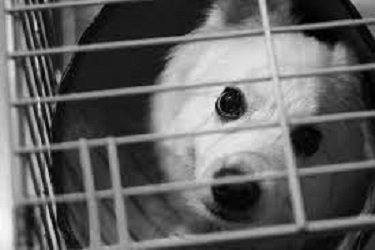If you have a puppy at your home then you do face some issues while raising it. However, one of the most frequent problems with puppies is that it takes time to train them. Especially, potty training requires a lot of patience and your puppy occasionally pees in its crate. The latter can irritate you as a pet owner and you have to clean the dog’s crate all the time.
Don’t worry if your 4 month old puppy is peeing in the crate because today we share some tips and techniques on how to stop a puppy from peeing in its kennel.
So go get your puppy and let’s learn together.

Why does my puppy pee in the kennel?
If your puppy is happy with its crate then it will not make it dirty. So make your puppy’s crate a cozy place to rest. Moreover, you can give your puppy some rubber toys and a warm blanket to make its kennel into a comfortable space.
Furthermore, there are many reasons why your puppy does pee in its crate. The most common ones are as follows:
- Disturbed Peeing Routines
- Lack of bladder control
- Behavioral problems
- Medical illnesses
To find out the reason behind why your puppy pees in its crate, you have to go deep into this problem. That’s why we will discuss these causes one by one in detail.
Disturbed Peeing Routines in Puppies
If your puppy has a proper walking schedule then it will pee promptly. That’s why dogs who don’t walk as much develop peeing problems. So take your puppy on a morning walk regularly to prevent peeing incidents.
Moreover, a morning walk works more than a mental or physical exercise for puppies. As it also allows puppies to use washrooms on their way and keeps their crates from dirt and germs.
However, remember not to strain your puppy with exercise when you are leaving it in its crate before bedtime. Strenuous activity will make your puppy thirsty and it will take more water. Eventually, this will lead to frequent urination and your puppy will have to pee in its kennel.
Lack of Bladder Control in Puppies
If your 4 month old puppy lacks bladder control then it causes peeing in its kennel. However, every dog has a minimum bladder capacity which depends on its age, breed, and size. For instance, heavy-built Shepherds can hold their urine for more than 12 hours. That’s why they mostly don’t need to pee at night.
On the other hand, some dogs such as tiny-sized Labradors can save their pee for 8 hours at max. But how will you find your puppy bladder capacity? Don’t worry use this simple method by AKC and you will be going to get your answer.
Firstly, count your puppy’s age in months and then add 1 into the total age to it. The final answer will let you know the number of hours your puppy can hold its pee. For example, your puppy age is 4 months and after adding 1 into it, it will make a total of 5 hours before your pets want to go to the toilet.
Isn’t it simple? Memorize these time limits in your mind because they will stop your puppy from urinating its cage.
Behavioral Problems in Puppies
Separation anxiety is among the most prevalent behavioral issues that cause crate peeing in puppies. Moreover, your puppy feels separation anxiety after losing its family or owner. In addition, getting into a new home or the inclusion of a new pet can sometimes trigger anxiety in dogs.
One way to deal with separation anxiety in dogs is by applying the counterconditioning technique. The latter helps you to develop a positive association between the situation that puts your puppy in an anxious state.
For example, if your puppy feels nervous after you leave the house and this will lead to crate peeing. Then give your puppy a retreat such as a toy or food when you’ve to leave your home. This will create a positive image in your puppy’s mind. Furthermore, your pet will feel less anxious and pee less in its kennel.
Medical Illnesses in Puppies
If your puppy has suddenly started peeing in its crate. And even you have no such changes in your puppy’s routine or environment. Then this problem can be a result of any medical illness.
Many canine diseases can cause frequent urination in puppies. Some of them are:
- Urinary tract infections
- Hormonal disturbance due to spay surgery
- Age-related weak sphincter
- Kidney and bladder stones
- Diabetes
- Reproductive and neurological diseases
Apart from above-mentioned health conditions, certain food allergies and medicines can also cause your puppy to lose control over its bladder. The latter will result in kennel peeing in puppies.
However, if your puppy seems weak to you or shows any abnormal signs or symptoms then do contact a veterinarian for proper advice.
How to stop your 4 month old puppy from peeing in the crate?
Once you have identified the reason why your 4 month old puppy is urinating in its kennel. The next step is to control it from doing that activity. We have collected some proven strategies and techniques that will help you to stop your dog from peeing in its crate.
Moreover, these tips will assist you in potty training your 4 month old puppy and will make your life better as a pet owner.
So without wasting any time, let’s find the solution to the problem.
Assess your Puppy’s health
Assess your puppy’s health and treat it if you find any abnormality. Many medical conditions cause frequent urination in dogs. Especially, urinary tract infections can make your puppy poop and pee in its crate. Moreover, if your puppy started peeing suddenly in its kennel then do check for the following signs:
- Note how frequently your puppy is peeing in its crate.
- Does any unusual odor come from your pet?
- Is your puppy’s urine dark or bloody?
- Is your puppy on medication or supplements?
If yes then the best way to stop your puppy from urinating in its crate is by booking an appointment with your veterinarian and having a routine checkup with them.
Fix your Puppy’s Crate Size
Improper crate size can undo all the work that you have done on your puppy’s potty training. Moreover, if you have given your puppy a big crate then maybe it is using a section of it for peeing and that needs to be changed.
The ideal size of the crate allows your puppy to stand, turn around and sleep. Anything giving more space will create problems for you. That’s why fixing your puppy’s cage size will stop it from peeing inside of it.
However, even the right cage size won’t resist the dog’s urge to pee in the crate. The latter is due to the following reasons
- Peeing in the cage becomes your puppy’s habit. Downsizing will not help it. That’s why to choose the right size of the crate from the beginning of potty training.
- Your puppy lived in a puppy mill where it had a tiny space to eat, poop, and pee.
- You have a tiny puppy. That’s why it holds its pee for a longer duration due to its small bladder.
Fixing crate size will sort out your problem. But if in case, it doesn’t then you have to take further measures to stop your puppy from peeing into its kennel.
Give your Puppy more Toilet Breaks
Puppies tend to pee more because they have tiny or undeveloped bladders. That’s why puppies find it difficult to hold their pee for more hours. And to relieve the pressure of their bladder, they mostly urinate within their cages.
Thereby as a 4 month old puppy parent, you have to plan a proper crate training schedule. Moreover, the ultimate solution to stop your puppy from peeing inside its crate is by potty training them. That’s why you have to add more toilet breaks in their training.
We have already discussed above that a 4 month old puppy can hold its pee for 5 hours. In addition, this regime will only work if your puppy knows that it will have to resist the urge to urinate.
Firstly start this potty training schedule by taking you twice then it needs. For instance, your puppy needs to pee after 5 hours. But you will take it to the toilet after 2.5 hours to treat its peeing incidents. Adjusting reminders on your phone will assist you to follow your schedule timely.
However, once you find improvement in your puppy peeing habit then start increasing the time intervals between toilet breaks. Your goal is to reach your puppy’s pee holding limit that is 5 hours. And in the process of reaching this limit, you will treat your puppy and it won’t pee inside of its crate.
Rewards help you to Potty Train your puppy
When you are potty training your puppy it is crucial to follow it during toilet breaks. Simply observe what your puppy is doing once you have opened its crate’s door. And the moment your puppy pees in its toilet, reward it by giving a treat. A pat on the puppy’s head, a bite of a cookie, or a toy can be given as rewards.
But you have to keep rewarding your puppy during the whole potty training process. So your puppy won’t get bored with it. Moreover, the sooner you will train your puppy to pee in its bathroom, the faster your puppy will stop peeing in its crate.
The Bottom Line
We have discussed in detail why your 4 month old puppy peed in the crate and how to stop it. So read all the above-mentioned techniques roughly and plan a proper regime for your pet. However, if you spot any unusual sign or behavior in your puppy contact a canine trainer or vet on an urgent basis.

